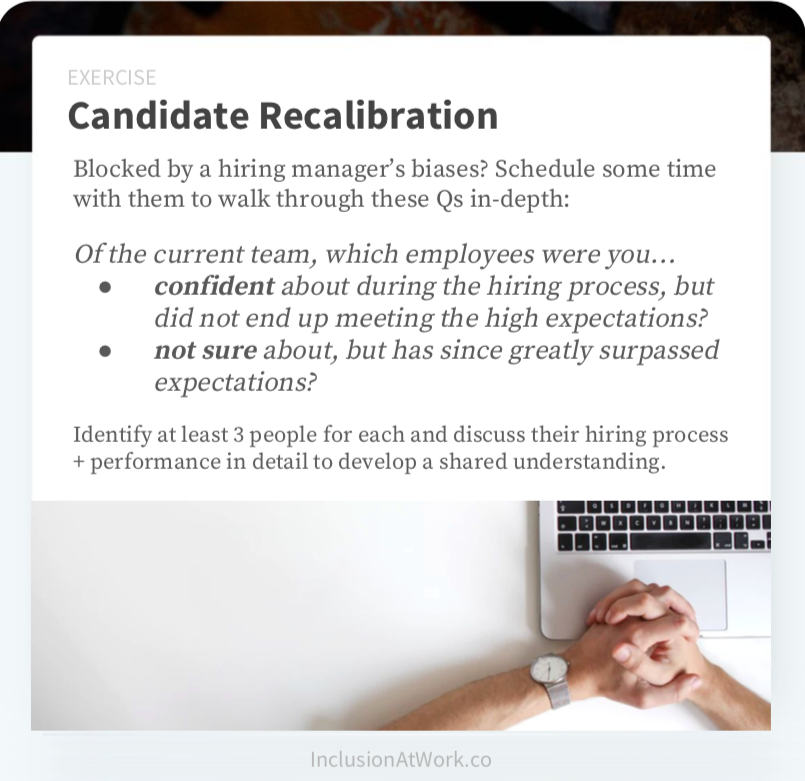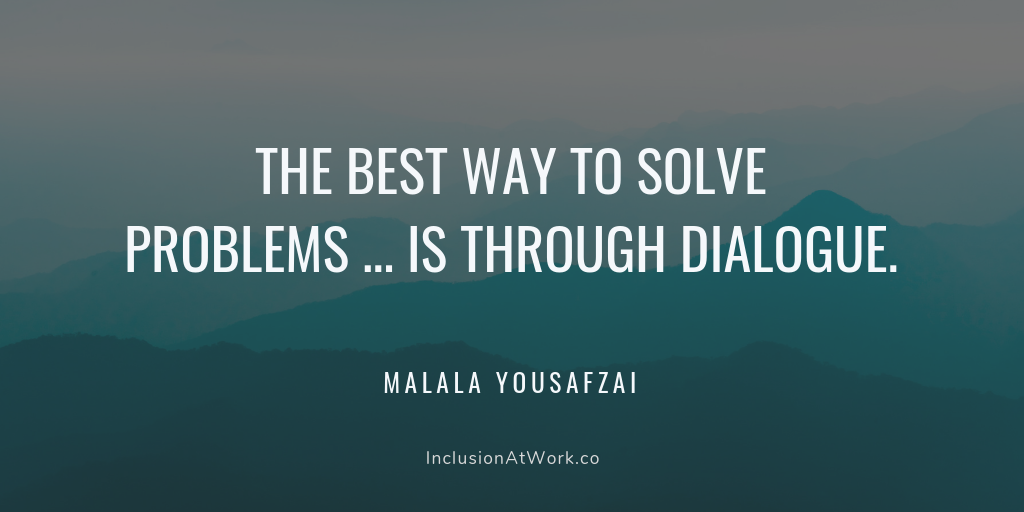Help! I’m blocked by a hiring manager’s biases!
"How can I recruit for diversity with a hiring manager who holds problematic views?"

Submit your own question about Diversity & Inclusion here and subscribe to weekly posts here!
∗ ∗ ∗
Dear Inclusion At Work,
I’m a recruiter, joined my current startup 3 months ago. So far it’s going well, except one problem. There’s a hiring manager I work closely with, who’s very traditional about what he’s looking for in candidates. I think he means well, but some of his beliefs and preferences makes recruiting for diversity very difficult.
He’s a well-respected senior leader in this company, but I’m concerned that he has some biases in how he evaluates candidates. For example, we just opened up a new role on his team, and he brought to the kickoff meeting a bunch of Linkedin profiles of what he considers the “ideal candidate.” They were all white (or white-passing) men with a very specific type of education pedigree. His team is also one of the least diverse in the whole company.
I don’t really know how to approach things with this hiring manager. As a woman of color myself, I don’t feel comfortable calling out a senior leader. Any advice?
-Hands Tied
Dear Hands Tied,
First, I want to acknowledge how exciting and challenging it can be to start a new job, when there’s so much to navigate through – the new culture, coworkers, all the while you're trying to figure out how to do your actual job well. And as a former recruiter, I understand how daunting it can be to work with a challenging hiring manager.
From my years of recruiting, I’ve worked with a wide gamut of hiring managers – from the wonderful to the problematic, to ones that sound very familiar to yours. For example, I once worked with a sales leader who would often say, “we gotta get more former college athletes in here.”
I have no doubt that some of the best sales reps did play sports, because they’re selected for and trained on the ingredients for a successful career in sales: the grind, team-player mindset, going for the win, etc. The problem was, this innocuous comment made non-athlete team members feel a little rejected, left to wonder if they weren’t as valued.
I want to make it clear, the hiring manager was still a great sales leader and by no means “the bad guy.” It was simply a saying he'd picked up from a previous company, which we are all prone to do. The issue was using the shorthand (“more athletes”) without unpacking the why, – leading us to potentially miss out on great sales reps without an athlete background. Plus, comments like this have a way of being amplified and internalized by the team.
First, we gave the hiring manager direct, but kind feedback, with the above reasoning. He responded well and adjusted quickly. But because the sentiment had already been spread to the team, I then collaborated with one of the reps to write a blog post about diversity in sales. This post helped our sales team re-articulate the image of a great team member. As an unintended side-effect, the post also made rounds with other companies and sparked a conversation among many tech sales offices about what a successful sales rep can look like.
We all hold beliefs like “Athletes are great salespeople.” Favoring certain schools/majors over others. Extroverts over introverts. Getting swayed the mention of a “hot” startup on a resume. And so on. Some of them may actually be useful – correlated with actual talent and potential! But their usefulness is limited because they’re only proxies for what you’re actually looking for: a great hire. Too often, recruiting processes skip the stage of identifying, then articulating the actual desired skills and qualities. Then, we end up overlooking talented people who may be great for our companies – only because they don’t fit the archetypes in our heads.
As we grow, we constantly question our beliefs and update them to make sure they’re serving us. Interestingly, the more senior and successful you get, the more of these ideas need to be re-examined! But old habits die hard, especially since they may have served leaders well thus far. But Hands Tied, you as a recruiter can help your hiring manager begin to question some of his assumptions.
But “calling out” this hiring manager probably isn’t an effective strategy. I personally have yet to see anyone respond well to “Hey, you’re being sexist/racist/-ist/discriminatory.” I understand it might be frustrating… especially because there’s usually an implicit power dynamic in the recruiter-hiring manager relationship. Your ability to work well with this person has a direct impact on your personal success, career, and livelihood. All the more reasons to build a shared understanding!
Hungry for more stories about Diversity & Inclusion?
Subscribe to get new posts delivered to your inbox! 📩
I recommend anchoring this challenge around “How do we ensure we get the best hires possible for X team?” as opposed to, “How do we hire more underrepresented candidates for X team?” or “How do we stamp out Hiring Manager’s problematic views?” I would take a more human approach, in being curious and seeking to truly listen and understand – and walking through the hiring manager’s batch of Linkedin profiles and what specifically about the candidate profile is a favorable sign to him.
There’s a saying, “prejudice thrives in abstraction.” It means for us to effectively break down biases, we need more conversations that can bring issues of D&I down to earth – not debating theory and statistics, but the specifics and the impact on actual humans.
For the times in I feel like my relationship with a hiring manager wasn’t going well, I developed an exercise called Candidate Recalibration. It’s pretty simple – schedule some time to walk through these questions together in-depth:
Of the current team, which employees were you…
• confident about during the hiring process, but did not end up meeting the high expectations?
• not sure about, but has since turned out to surpass expectations?
Have them identify at least 3 employees each category, then take the time to walk through details from their hiring process and their performance to identify patterns. I’ve found this exercise so effective and worth the time because it allows the hiring manager and I to work from a shared reality, instead of vague guesses about why people with Ivy League degrees are inherently "better."
New insights get surfaced when you revisit your assumptions – expectations about a candidate – and check them against reality – the actual results. I can’t tell you how satisfying it is to watch a hiring manager stumble upon a stroke of insight, “Hmm, now that we’re looking at it like this, it does seem like my X proxy has not led to my most successful hires – actually the opposite.” Best of all, I don't have to tell them – they learn it themselves! The Candidate Recalibration exercise almost always leads to broadening of one’s mind, which then results in more diverse teams. For more tips, this post includes more details about the Candidate Recalibration exercise.

Hands Tied, I know I might be asking a lot of you to be very patient in approaching these conversations. But I want you to be successful in your new job and for you to have all the perspectives and tools to give it your best effort. And in this case, it’s getting past another person’s prejudice and truly being curious to figure out how you can work effectively together towards your shared goals.
I’ve had my fair share of difficult hiring managers, but not all of them stayed that way. With structured conversations and yes, some patience, we were able to learn from each other and over time, built trust. I hope for a similar outcome here.
But if your hiring manager turns out not to be open-minded as we would hope – honestly, that’s ok too. It’s not your job to fix anyone. Be sure to keep your manager updated on your progress and ask for them help, because this is not something you should take on alone. Your priority – especially as a woman of color – is to do the best job you can while doing what’s best for you. Either way, I’m rooting for your success and wishing you the best of luck.
Yours,
Jen

Thanks to Bukky Adebayo for edits 💛
Image from NordWood Themes on Unsplash

